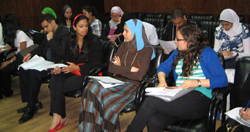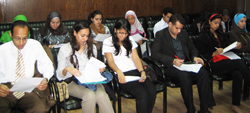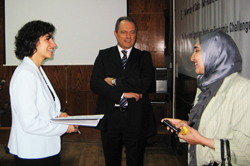IMF Middle East Youth Dialog
Summary of the Roundtable Discussion Held at The University of Cairo
March 7, 2010 A lively discussion took place among a group of 20 students and IMF staff. The students argued that Egypt’s policy priorities should be to reduce unemployment and poverty, and improve the education system. They broadly agreed on the best means to reach these goals, but expressed different views on the role that the IMF should have in Egypt. The students also debated the lessons that could be drawn from the global financial crisis.
A lively discussion took place among a group of 20 students and IMF staff. The students argued that Egypt’s policy priorities should be to reduce unemployment and poverty, and improve the education system. They broadly agreed on the best means to reach these goals, but expressed different views on the role that the IMF should have in Egypt. The students also debated the lessons that could be drawn from the global financial crisis.
Students at the University of Cairo agreed that unemployment—particularly among the youth—was a major problem in Egypt, and should be tackled on several fronts. They noted that economic stability and low inflation were important prerequisites for economic growth, which would carry with it the job creation that Egypt needs. The students called for a partnership between the private and public sectors for balanced economic development.
 More specifically, most students stressed that encouraging domestic—as well as foreign direct—investment had an important role in job creation. Excessive red tape and regulations, in addition to corruption, now hamper investment. Increased transparency and better governance were needed to improve the investment climate.
More specifically, most students stressed that encouraging domestic—as well as foreign direct—investment had an important role in job creation. Excessive red tape and regulations, in addition to corruption, now hamper investment. Increased transparency and better governance were needed to improve the investment climate.
The students also noted that access to credit was difficult for many businesses, especially small enterprises. They called for lowering interest rates, simplifying credit rules, and creating schemes to facilitate borrowing by young entrepreneurs.
Many students insisted that Egypt’s comparative advantages should be exploited: the country has abundant natural resources, vast land, and a large population, all positive characteristics that yet need to be made the most of. In particular, the country has a clear significant advantage in agriculture, a sector that should be better supported by the government and that could generate a larger share of the country’s GDP.
Several students emphasized the problem of widespread poverty. They called for better targeted subsidies, and increased empowerment of Egyptian men and women to combat this phenomenon. They also noted that progress in fighting unemployment would surely result in lower poverty.
Some students argued that focusing on long-term factors alone would not suffice, calling for rapid action to kick-start the economy and create jobs. They cited market liberalization and lowering of barriers to goods and services across borders as part of the short-term toolkit. Others responded, however, that long- and short-term measures should be implemented in tandem: in particular, trade liberalization should proceed hand in hand with an upgrade of the quality of Egyptian products so as not to put them at a disadvantage. Students almost unanimously believed that education reforms were a must for addressing the skills mismatch—that is, to help align the supply of talent with market demand for labor. They called for a modification of curricula (noting that they were too theoretical) and for the set-up of training programs and hands-on internships, possibly with the help of the private sector. They stressed the importance of orientation programs to guide high-school students in forming their career choices. Education should be offered to all, through subsidies as needed.
 In response to the question of what the IMF’s role should be in their country, students called upon the Fund to help Egypt in managing its economic resources, and addressing income disparities and dependence on aid. The IMF had a role in advising on structural reforms to strengthen Egypt’s economy, in particular the financial and banking sector. However, students were divided on the precise nature of that role: while some viewed it as purely advisory, many hoped that it could acquire a more forceful character in order to ensure that Fund advice is implemented.
In response to the question of what the IMF’s role should be in their country, students called upon the Fund to help Egypt in managing its economic resources, and addressing income disparities and dependence on aid. The IMF had a role in advising on structural reforms to strengthen Egypt’s economy, in particular the financial and banking sector. However, students were divided on the precise nature of that role: while some viewed it as purely advisory, many hoped that it could acquire a more forceful character in order to ensure that Fund advice is implemented.
Lessons from the financial crisis
Crises are inevitable, according to the students. There is no perfect, immune system. It is therefore important to study the past and learn from history how to best prepare for the next crisis. More information is also needed on the various intricacies of today’s economies. We need to better understand how markets work, given that the complexity of financial instruments was at the root of the crisis. Also, borrowers should strive to better understand the contracts they engage in.
Students generally agreed that regulatory reform is a must. While some argued for more rules, others pointed out that better regulation was needed. Governments should not become intrusive and infringe upon individuals’ rights to engage in economic activities freely. Rather, regulations should be clearer and should address the root of the problems that were exposed by the global crisis. Specifically, students called for rules that ensure borrowers’ ability to repay loans and restrict banks’ ability to extend mortgages. Countercyclical regulation is needed to encourage banks to lend more in downturns but restrict lending in upswings.
Some students called for reducing interlinkages of financial markets around the world to prevent the cross-border spread of crises in the future. Others, however, noted that this would be counterproductive: limiting capital flows would choke off economic growth, which would be too dear a cost to pay for financial “safety”.
Students called upon the IMF to dispel “conspiracy theory” myths about it, and to improve its image. They welcomed the IMF Youth Dialog initiative, viewing it as a good first step in “informing” the public about the Fund. They encouraged the Egyptian government to undertake similar initiatives and provide fora for the youth to express their views and encourage their participation in public policy.
Noting that today’s crises were much bigger in scale and more devastating than in the past, several students called for international organizations to have a key role and a say in individual countries’ economic policies. They called for the IMF, given its experience and financial capability to help countries deal with crises, to acquire more clout: its role should go beyond surveillance, into policy enforcement, which would help countries avoid crises. A few students, however, rejected the notion of greater IMF involvement and preferred the Fund to continue playing an advisory role.

